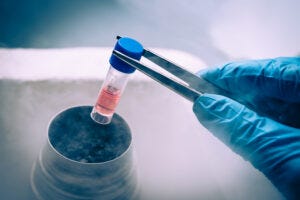April 28, 2023

The $650,000 partnership hopes to reduce manufacturing cost and increase immunoactivity for iPSC-derived allogenic cancer immunotherapies.
The strategic partnership between UK-based Plasticell and Singapore-based LambdaGen will develop induced pluripotent stem cell (iPSCs) derived chimeric antigen receptor-natural killer (CAR-NK) allogenic cancer immunotherapies.
The collaboration is funded by EUREKA GlobalStars, an international research and development funding program.

Image: DepositPhotos/
OlenaPavlovich
LambdaGen will be responsible for generating the iPSC lines engineered with CARs that enhance the anti-tumor activity of the body’s immune cells. Plasticell will use its combinatorial screening technology, CombiCult, to convert the iPSCs into NK cells.
“Cellular immunotherapy using CAR-T cells has revolutionized cancer treatment, but these personalized medicines have significant manufacturing constraints and are prohibitively costly. There is a need for alternative ‘off-the-shelf’ immunotherapy products, which can be met by engineered NK cells capable of functioning in an allogeneic setting,” says Dr Marina Tarunina, research director of Plasticell.
“iPSCs can be engineered with various functionalities to increase safety and efficacy of differentiated immune cell products, and to reduce the manufacturing complexity and cost. LambdaGen’s technology allows facile insertion of multi-gene cassettes at pre-determined safe harbour sites of the human genome”, says Dr Harshyaa Makhija, CEO of LambdaGen.
iPSC-derived immunotherapy platform
Immunotherapy is a type of cancer treatment that uses the body’s own immune system to recognize and attack cancer cells.
NK cells are one of the most common sources for immune-cell-based cancer therapies. iPSCs can increase antitumor activity by providing a stable platform for genetic modifications to increase immuno-activity, such as transducing CARs.
iPSCs allow clonal engineered immune cells, such as NK cells, to be generated on a large scale and are considered to be “one of the most immediate and exciting applications in the development of cancer immune cell therapies”.
About the Author
You May Also Like




